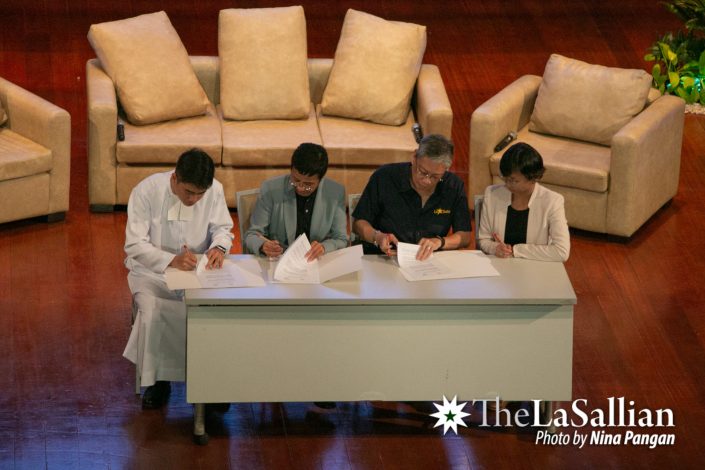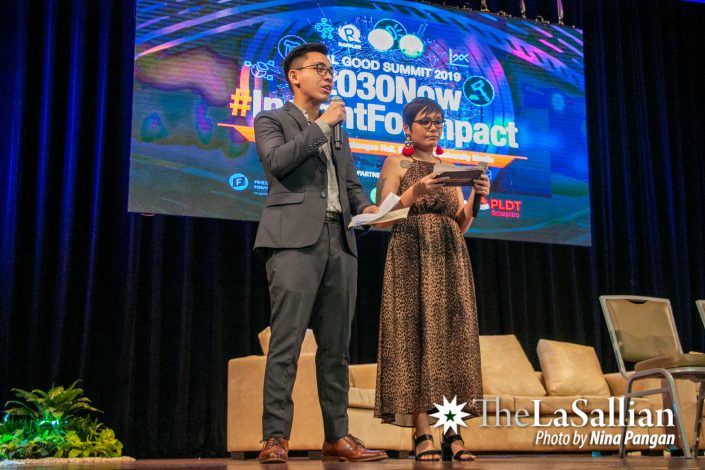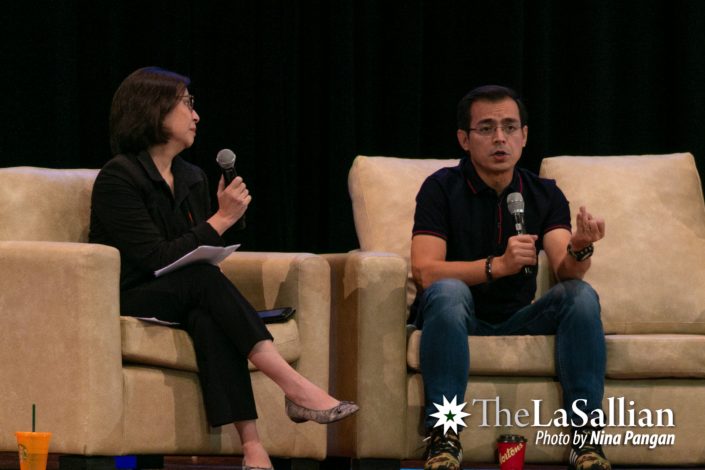Different sectors of the community took the stage last September 21 to urgently appeal for the pursuit of the Sustainable Development Goals for 2030 at Social Good Summit 2019, held at the fifth floor of Henry Sy Sr. Hall and the Teresa Yuchengco Auditorium.
Now on its seventh run, this year’s summit featured the theme Insight for Impact, focusing on utilizing media and digital culture, building up transportation and mobility, promoting gender equality, and meeting the demand of zero waste. Mayors, industry delegates, advocates, and civic leaders presented strategies in advancing the global sustainability effort.

Inspire courage
A plethora of speakers met participants in the Huddle, a session dedicated to exchanging insights on various concerns identified as part of the summit’s agenda. Each representative took turns expressing their proposed solutions on stage.
Chiqui Mabanta, President of Winner Foundation, praised the success of the Save Arroceros Movement—which allowed Arroceros Park to be declared permanent. “Almost 200,000 people signed this petition online, so all of a sudden [they] knew of the park’s existence,” she stated.
Rina Gascon Fulo from OXFAM Pilipinas introduced the Sexual Health and Empowerment project, which aims to empower women to secure their sexual and reproductive health rights, “We need to remove the veil of stigma and shame, and instead view our bodies and our sexuality as a site of empowerment.”
Speaking for AltMobility, a group composed of citizens and urban transport experts that aim towards creating better mobility and transportation systems, Ira Cruz asserted the need for effective transportation systems and lambasted the existence of “inhumane” transport policies in the country.
Wilhelmina Garcia, founder of Junk Not, meanwhile, described how the organization transforms regular plastic waste into furniture pieces and how it taught its partner community to properly manage plastic waste and use it as a source of livelihood.
Uproot Philippines founder Robi del Rosario scrutinized the state of food security in the country and encouraged the audience to support local farmers and the agriculture industry, as well as to scrutinize where one’s food comes from.

Beyond a national dialogue
Political leaders also presented their stands; Resident Coordinator of the United Nations Ola Almgren advocated for dialogue at the regional, national, and global levels to address the world’s problems effectively, emphasizing that collective effort is required to tackle important issues.
Manila City Mayor Isko Moreno, Quezon City Mayor Joy Belmonte, and urban planner Paulo Alcazaren participated in a panel discussion which closed in on improving urban living. Being the chief executives of the country’s two most populous cities, both Belmonte and Moreno agreed that Metro Manila needs an elected governor. “Metro Manila consists of 17 mayors who are elected, and you have Metropolitan Manila Development Authority that is led by someone who is not elected, who is appointed, and ang papel niya is to coordinate,” the Quezon City mayor pointed out.
Despite the consensus, Moreno maintained that the current government system can still be retained.
“Meron nang gobyerno. In fact, I’ll tell you honestly, you can call it communism, you can call it capitalism, monarchy, federalism, parliamentary. Immaterial of forms of government, at least may gobyerno. Kung may gobyerno tayo, let’s work on it,” the Manila City mayor stated.
(We already have a government. In fact, I’ll tell you honestly, you can call it communism, you can call it capitalism, monarchy, federalism, parliamentary. Immaterial of forms of government, at least there is a government. If we have a government, let’s work on it.)

A collaborative effort
On the other hand, Melody Melo-Rijk of World Wildlife Fund, Monique Obligacion of Buhay Zero-Waste, Joy Cacal of Coca-Cola, and Dr. Fabian Dayrit of the National Academy of Science and Technology deliberated on strategies to solve the plastic and waste crises.
Obligacion reiterated that large-scale consumerism is to blame and not shortfalls in waste management. “The real problem is overpopulation and consumption. We [should not] just think downstream of our disposals, [but] we [also] have to think upstream of our purchases,” she explained.
Google News Lab Lead Irene Jay Liu, Philippine Daily Inquirer columnist John Nery, and author Andrew Keen also came together to discuss responsibility of platforms in keeping journalism alive. Nery claimed that trust is the least of the problems of modern-day journalists, “I think the problem is utility. Even if people may not trust us, they find us useful.“
“The idea is to solve the problems we have [because] one person is not enough,” Rappler’s CEO Maria Ressa pointed out as she concluded the event. Ressa urged that the fight for various advocacies and goals continues on a global rather than individual scale, and addressed the audience, “your voice matters.”
Beyond simply providing a space for collective efforts, the summit served as a venue for De La Salle Philippines and Rappler to formally partner up toward the goal of promoting social good among Lasallians and the general public.
